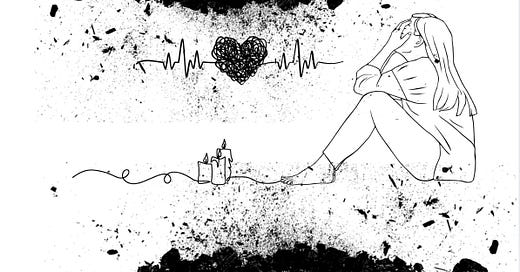this piece was born in the dark, but it lit something in someone else. i wrote it for myself—and found out i wasn’t alone.
i built my first altar on the kitchen floor
with shaking hands and a plastic lighter that barely worked.
the incense snapped. i didn’t have a holder,
so i stuck it in dry rice inside a chipped mug with a cartoon cat on it.
there was mayonnaise on the counter. crusted tomato paste on the stove.
and i was wearing the same t-shirt i cried in the night before.
i didn’t know what i was doing.
i just needed something to hold me when nothing else did.
no one taught me how to pray through panic.
no one explained how to summon protection
when the threat lives inside your own nervous system.
and so i lit the candle anyway.
i whispered to the ceiling.
and i called it sacred.
my altars have always been unrecognizable.
they are full of half-prayers and broken promises.
burnt edges of old journal pages.
a crusty lip balm i keep “for emergencies.”
my hospital badge.
a loose stone i picked up in a forest during the worst year of my life.
crushed paracetamol packets.
withered rosemary from the last time i believed in cleansing.
a roll of medical tape i forgot to return.
this is what faith looks like when it’s stitched from survival.
not holy water—just water i remembered to drink.
not a psalm—just the sound of my own breath not catching for once.
i used to think i needed crystals.
that i had to wait until the full moon.
that i had to be pure or peaceful or calm.
but then i remembered:
my bloodline didn’t have peace.
they had survival.
they had burning villages and unmarked graves and red thread prayers tied tight so the baby wouldn’t die.
they had bread and silence and women who forgot how to speak their own names out loud.
they didn’t have palo santo.
they had matches,
and grief,
and the moon as the only thing no one could steal.
i come from women who lit candles during wartime because the power was out, not because it was aesthetic.
who prayed while holding their children’s names in their teeth.
who stitched spells into pillowcases and buried grief in the garden.
nobody handed me a ritual guide.
i had to invent my own way to ask the universe to please not let me collapse in the middle of the ward
while holding someone’s mother’s hand as she bled out.
i prayed with wrist pain. with rage. with paroxetine in my bloodstream.
i anointed my temples with tears and tiger balm.
and that—that—was the most spiritual thing i’ve ever done.
i am not trying to be a pretty witch.
i am trying not to vanish.
i am trying to stay soft
in a world that demanded my numbness.
i am trying to scream without losing my job.
i am trying to grieve without being told i’m dramatic.
i am trying to create a life that doesn’t devour me.
and so i write.
and so i burn candles in the morning even when the dishes are rotting.
and so i brush my hair even when i don’t believe i’m worth touching.
and so i let my body remember things my mind hasn’t been brave enough to name.
my altar is the fact that i still write.
that i still feel things.
that i still want to try, even when everything in me says hide.
i don’t always believe in angels,
but i believe in breath.
in the sound of rain at 3 a.m. when i want to disappear.
in the way my cat lays beside me like she’s guarding a soul i don’t know how to protect.
sometimes my rituals are just brushing my hair while whispering,
“you made it. you made it. you made it.”
my altar is wherever i let myself be witnessed
by myself.
it’s not the physical objects—it’s the moment i don’t lie.
not to the universe.
not to myself.
not to the silence in my bones.
some days, i write like a spell’s being pulled through my teeth.
other days, i can’t speak at all.
both are sacred.
there are old notes from the psych ward in my drawer.
a perfume i used when i thought being desirable would save me.
a photo of me smiling when i was the most unsafe.
these things don’t belong on pretty altars.
but they’re mine.
they’re the proof i walked through hell barefoot and kept something of myself intact.
some days, my altar is my laptop and my panic.
other days, it’s just my body in the shower, begging to feel safe again.
sometimes i write poetry that sounds like a spell.
sometimes i stare at the ceiling and call that devotion.
don’t tell me sacred has to look a certain way.
i’ve seen women survive war with nothing but a match and a memory.
i’ve seen my own reflection at rock bottom and still kissed her forehead.
my altars hold:
my rage
my empty stomach
my ruined routines
the voice that says “no”
the dream i had about my grandmother’s hands
the version of me who wanted to die but didn’t
i write beside my altar.
i weep beside it.
i sometimes forget it exists and then build a new one out of panic.
this is not sacred discipline.
this is sacred chaos.
and it still counts.
it always counts.
so to the ones who think they’re not doing it right:
because the candle’s crooked
or your prayer didn’t rhyme
or you forgot to cleanse yourself before screaming—
you are not doing it wrong.
you are alive.
and that is the only requirement.
you don’t need linen robes.
you don’t need a clean house.
you don’t need a trauma-free voice or a happy ending.
you need to be here.
and when you can’t be here—
you build something small enough to hold you.
a moment.
a match.
a mug full of saltwater and intention.
a poem.
a whisper.
a hand on your chest that says, “stay.”
my altars aren’t pretty.
they’re cracked.
they’re tired.
they’re built from everything i was never allowed to say.
but they burn.
and that’s what makes them holy.
and if you have a corner of your soul that still lights a candle for yourself—
even once in a while—
you’re holy, too.
For Those Building Altars in Grief
A Three-Step Ritual for When You Don’t Know Where to Begin
you don’t need to believe in anything except your own presence.
you don’t need fancy oils, white robes, or peace.
you just need a moment that’s yours.
step one: claim your corner
Find a space—a corner of a table, a bathroom shelf, the floor beside your bed.
Place one object there that holds weight:
a stone, a tear-stained paper, a spoon from your mother’s kitchen, the lip balm you held during your last panic attack.
Whisper or think:
“This is mine. This is sacred.”
That’s it. That’s the altar.
step two: bring your body back
Place your hand on your chest or jaw—wherever the ache lives today.
Breathe in through your nose.
Breathe out like a sigh you’ve been holding since childhood.
Say (out loud or in your bones):
“I am allowed to be here. Even like this.”
Let that be enough.
step three: feed the flame
Write a word. Light a match. Hum.
Do one thing—tiny, imperfect, defiant.
It doesn’t have to look magical.
It doesn’t have to fix you.
It just has to remind you:
you are still here.
and that matters.
you are the altar.
your grief is the offering.
your breath is the ritual.
and the fact that you’re reading this right now?
that’s the fire that never went out.
© 2025 Solena Vyhra. All rights reserved.
This work is part of the poetry collection The Crown Was Never Yours.
No part of this poem, including text or visual design, may be reproduced, distributed, or transmitted in any form or by any means without prior written permission from the author.
For inquiries, permissions, or collaborations, please contact: solenavyhra@gmail.com
Illustration and layout by Solena Vyhra.
Typography: Special Elite (poem titles), Signature (author tag).
Published on Substack via Where Silence Becomes Ritual.









yes 1000% - thank you for this, for the personal details and the invitation for others to find their own sacred space.
“this is what faith looks like when it’s stitched from survival.”
This is the darkest yet most touching and beautiful metaphor I’ve ever heard or read…especially as a Catholic. I stuck in me like a knife. Explained things to my heart my mind could never let in. Until now. It explains my darkness, generational survival and all the women in our family going back generations “being lit” and that’s why I’m here.
Thank you
Donna